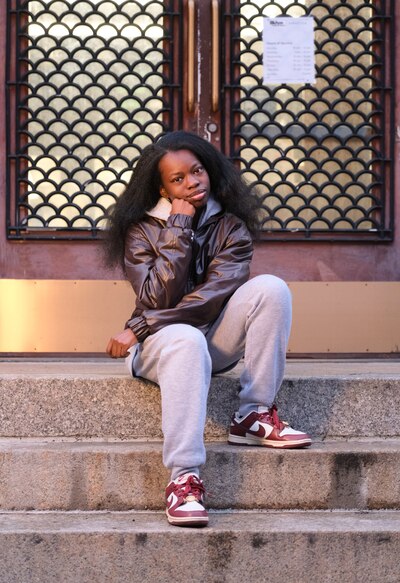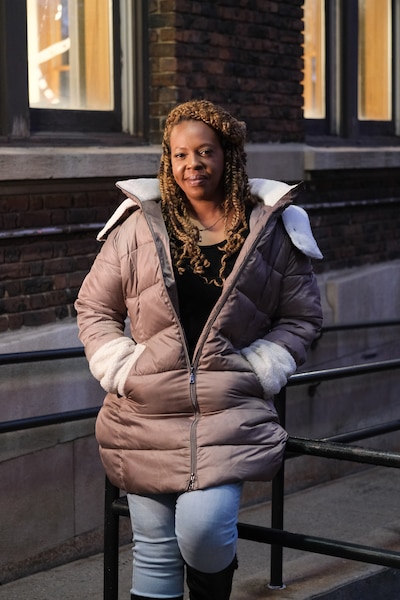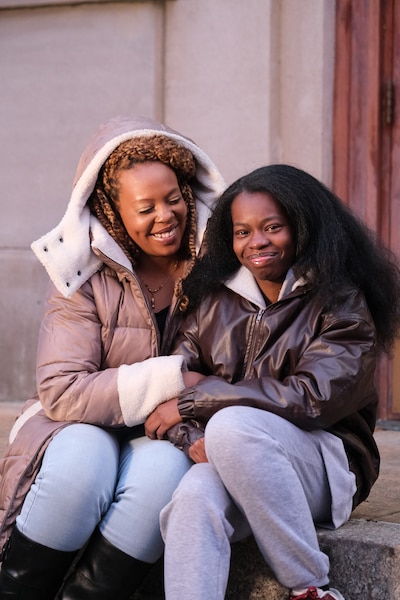Join Chalkbeat New York’s free every day e-newsletter to maintain up with NYC’s public colleges.
A model of this story is being co-published by the Related Press.
Derry Oliver was in fifth grade when she first talked to her mother about seeing a therapist.
She was residing in Georgia together with her brother whereas her mother was in New York scoping out jobs and residences forward of shifting the household. It was a tough yr aside. Oliver, now 17 and a senior at Cobble Hill College for American Research in Brooklyn, was feeling depressed. A college staffer raised the thought of a therapist.
Turn out to be a Chalkbeat sponsor
Oliver’s mother, additionally named Derry Oliver, questioned the varsity’s evaluation and didn’t give consent for remedy. “You’re so younger,” the mother recalled considering. “There’s nothing unsuitable with you. These are rising pains.”
The problem boiled over once more throughout the COVID-19 pandemic when the youthful Oliver, fighting the isolation of distant studying, reached out to her faculty for assist. College-based psychological well being professionals like social employees can present some counseling with out mother or father permission. However in New York, referring a scholar to extra intensive remedy virtually at all times requires a mother or father’s settlement. In Oliver’s case, that led to extra battle.
“It was very emotional for each of us as a result of I understood her frustrations and fears,” the youthful Oliver recalled. “However on the similar time it’s generally finest in your little one to have the ability to entry this moderately than maintain it away from them.”
As colleges throughout the nation reply to a youth psychological well being disaster accelerated by the pandemic, many are confronting the thorny authorized, moral, and sensible challenges of getting mother and father on board with remedy. The problem has change into politicized, with some states seeking to streamline entry as conservative politicians elsewhere suggest additional restrictions, accusing colleges of making an attempt to indoctrinate college students and reduce out mother and father.
However for households just like the Olivers, the choice to start out a toddler in remedy is commonly deeply private – mentioning cultural and generational divides, in addition to diverging understandings of psychological well being.

Differing views on psychological well being aren’t new for fogeys and youngsters, however extra conflicts are rising as younger individuals get extra comfy speaking brazenly about psychological well being and remedy turns into extra available, particularly with the expansion of telehealth and on-line counseling.
“It’s this disconnect,” stated Chelsea Trout, a social employee at a constitution faculty in Brooklyn. “The youngsters are all on TikTok or the web and perceive remedy communicate and that that is one thing that could possibly be useful for his or her psychological well being and are all for, however don’t have the express buy-in from their mother and father.”
Turn out to be a Chalkbeat sponsor
Analysis means that having to acquire parental permission generally is a vital barrier to teenagers accessing remedy.
Entry to remedy will be vital, notably for LGBTQ youth, who’re considerably extra possible than their friends to try suicide, and whose mother and father could not find out about or approve of their sexual orientations or gender identities. Dr. Jessica Chock-Goldman, a social employee at Bard Early Faculty Excessive College in Manhattan, stated she’s seen many instances the place psychological well being points flip extreme partly as a result of teenagers didn’t get earlier entry to remedy.
“Quite a lot of youngsters can be hospitalized due to suicidal ideations or intent as a result of the preventative work didn’t come into fruition,” she stated.
Legal guidelines about consent differ broadly by state
The query of when younger individuals can consent to psychological well being remedy is getting growing consideration from policymakers. States like California and Colorado have not too long ago lowered the age of consent for remedy to 12. However in some states like North Carolina, the problem has been swept up into bigger political debates about mother and father’ enter on curriculum and the rights of transgender college students.
There’s additionally an enormous impediment exterior the legislation: Remedy isn’t free, and paying for it or submitting insurance coverage claims usually requires parental assist.
Teenagers in New York can consent to remedy beginning at age 16, and a provision permits docs to authorize remedy for youthful kids in the event that they deem it of their finest curiosity. However there are caveats: The consent legal guidelines solely apply in outpatient settings licensed by the state, they usually don’t prolong to the prescription of medicines.
New York Metropolis Mayor Eric Adams not too long ago introduced a partnership with the platform Talkspace to offer free on-line counseling to all metropolis teenagers, via a program generally known as NYC Teenspace. It doesn’t ask for insurance coverage, however parental consent is required, “besides within the case of particular circumstances,” in line with this system’s web site.
Turn out to be a Chalkbeat sponsor
Aside from the authorized and moral concerns, clinicians famous that psychological well being remedy for teenagers is nearly at all times more practical when mother and father are on board.
“In a perfect world, completely I’d love extra entry to remedy for these youngsters with the hope they’ll discuss to their mother and father about what’s taking place,” stated Chock-Goldman. “As a result of I consider nothing adjustments until you modify a household system.”
A mother and daughter cut up on remedy
For the 2 generations of Oliver ladies, their divergent views of remedy are rooted in very completely different upbringings.
The elder Oliver, 36, was raised in Georgia within the Eighties and ‘90s, when individuals “didn’t communicate on psychological well being so much.”
As a child, Oliver knew some individuals in remedy, however primarily as a result of “they skilled one thing extraordinarily traumatic.”

As she obtained older, Oliver had her personal encounters with therapists. She was identified with despair and prescribed medicine that made her really feel like a “zombie,” she stated.
Oliver has additionally felt the sting of being labeled as “aggressive” merely for expressing her feelings as a Black lady – a actuality that’s made her reluctant to speak in confidence to therapists who aren’t themselves Black ladies.
She’s involved that permitting her daughter to see a therapist may result in a prognosis that brings the identical form of medicine she so despised.
“Child, there’s nothing unsuitable with you,” Oliver tells her daughter. “You don’t have any psychological points. You don’t must be placed on anybody’s medicine.”
The youthful Oliver sees issues very otherwise. She grew up with associates who noticed therapists with out experiencing acute trauma. And she or he discovered quite a few examples on platforms like TikTok and Instagram of teenagers with related tales who had benefited tremendously from remedy.
“You don’t even must have anxiousness or despair and I don’t even know if I do or not,” she stated. “However if you happen to really feel as if one thing isn’t proper or okay with you, then I believe that’s when an individual ought to have the opportunity” to entry remedy.
For Oliver and her mother, years of conversations have yielded some progress, however not as a lot entry to remedy because the youthful Oliver desires.
A number of years in the past, the Olivers agreed on a compromise. They discovered a Black feminine therapist, and the elder Oliver agreed her daughter may begin remedy – so long as she sat in on the periods. However the therapist modified jobs after a couple of month, and Oliver hasn’t seen one other therapist since.
“It must be somebody reliable,” the elder Oliver stated of a possible therapist for her daughter.
New initiatives are within the works
Trout, the varsity social employee on the Brooklyn constitution faculty, stated she’s encountered quite a lot of mother and father who, like Oliver, don’t belief the varsity’s suggestions, and marvel why their little one would want remedy in the event that they’re succeeding academically and socially.
“If we’re serious about predominantly Black and brown communities, in case your interactions with social employees or psychological well being companies or something in that realm so far haven’t been constructive,” she stated, “how may you belief them together with your youngsters?”

Statistics do present a racial divide. In 2021, 14% of white kids reported seeing a therapist in some unspecified time in the future throughout that yr, in comparison with 9% of Black kids, 8% of Hispanic youngsters, and solely 3% of Asian American kids, in line with a survey from the Facilities for Illness Management.
The obstacles are sometimes notably excessive in immigrant communities, the place there generally is a robust stigma, or just a lack of information about “what remedy or counseling seems like or means,” stated Cindy Huang, a toddler psychologist and professor at Columbia College Academics Faculty. Huang was not too long ago awarded a grant to launch a pilot program to extend entry to psychological well being remedy for youth prone to suicide in Manhattan’s Chinatown.
Advocates and consultants are persevering with to push policymakers to offer younger individuals extra freedom to consent to remedy with out parental approval.
There’s a invoice pending in New York’s state Meeting that might give minors extra freedom to consent to their very own well being care, together with remedy.
With out entry to remedy, the youthful Oliver has sought recommendation about managing her feelings via associates, faculty social employees, and the web. However she’s satisfied she may do much more with constant skilled assist.
Oliver has already gotten into quite a lot of schools — to her mother’s monumental delight — and is weighing her choices for subsequent yr.
One factor she’s contemplating: how a lot entry they provide to therapists.
Michael Elsen-Rooney is a reporter for Chalkbeat New York, overlaying NYC public colleges. Contact Michael at melsen-rooney@chalkbeat.org.

